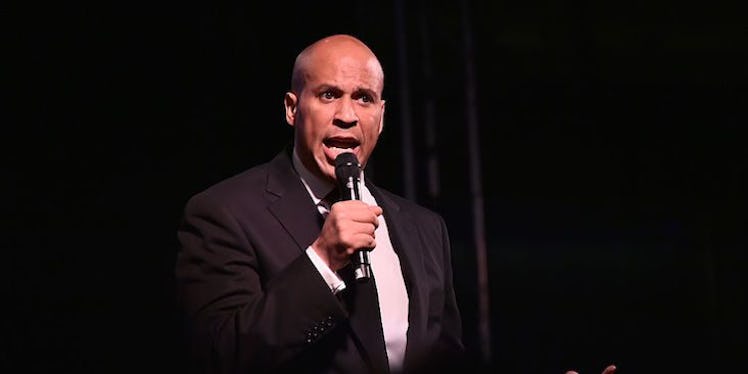
Senator Says The Sooner We Legalize Marijuana "The More Lives We Can Save" — EXCLUSIVE
On Tuesday, Aug. 1, Senator Cory Booker introduced a bill to legalize marijuana at the federal level. It's a bold plan that would be a vital first step toward ending the war on drugs. Senator Booker's bill not only seeks to legalize weed, but also to address the disproportionate impact marijuana laws have had on certain communities.
After he formally introduced the bill on Facebook, Senator Booker took some time to speak with me in an interview with Elite Daily about what's in the bill, why this issue is so important to him, and what it would mean for the country.
In Booker's view, it's only a matter of time before legalization becomes a reality, and he's just trying to jumpstart the process.
"The sooner we end [marijuana prohibition] the more lives we can save, the more communities we can stop from being devastated, and we can actually get back to restorative justice, and begin healing the hurt that's been caused by the war on drugs, which has really been a war on people," Booker says.
Booker's plan has four parts.
The first aspect of Booker's bill is to remove marijuana from the federal scheduling system, which would make it legal under federal law. Eight states and D.C. have legalized recreational marijuana, but it's still illegal at the federal level.
Booker's bill also retroactively expunges people who've been convicted for use and possession of marijuana and provides a route for people currently in prison for marijuana use or possession to petition for their sentences to be reduced or eliminated.
The plan would leverage federal funding to encourage states to legalize marijuana. Even if weed was legalized at the federal level, in theory, states could decide not take the same route. So, Booker's bill simultaneously pushes for legalization at the federal and state level, especially in states where marijuana laws are harshest.
"To repair that damage that's been done over decades," Booker tells Elite Daily, the bill also calls for a "community reinvestment fund," in which communities disproportionately impacted by marijuana laws would be able to apply for funding that could go toward job training, reentry services, public libraries, community centers, and more.
But why now?
Booker, a Democrat from New Jersey, has picked an interesting time to push for pot legalization at the federal level. Republicans currently control Congress and, while some have exhibited support for criminal justice reform in the past, aren't likely to prioritize legalizing pot at the moment. On top of this, Attorney General Jeff Sessions, who said marijuana is "only slight less awful than heroin" back in March, will be adamantly opposed to such a move.
But this is precisely why Booker says the time is right to "begin to force a larger conversation in our country and propose ending a very dangerous war on drugs." In many ways, this is about starting a discussion about the injustice surrounding the war on drugs, especially as it pertains to marijuana laws.
"I'm trying to highlight how marijuana enforcement has not been fair and equal and address the real consequences of having a drug war that was focused disproportionately on poor people, on minorities, on veterans, and on [addicts]," Booker says.
In Booker's view, Congress is way behind on this issue. He points to the fact that a majority of Americans are in favor of legalization, and that in states where marijuana is legal, violent crime has declined and revenue is up. Booker says the failure of Congress to keep up with the public on this topic is "devastating communities, particularly poor communities and communities of color."
While he faces many challenges in pushing this bill forward, Booker hopes Republicans in Congress will recognize this is not only what the American people want, it's also a practical and ethical way forward.
Booker hopes young voters will aid in this process.
There is no generation that supports marijuana legalization more than millennials, and Booker believes we have a vital role to play in the fight ahead.
"Frederick Douglass said, 'Power concedes nothing without a demand,'" Booker says, "and young people need to begin to demand from their leaders, on the state level and the federal level, that they change laws and bring justice to our criminal justice system around marijuana."
At a time when the president seemingly refuses to set a concrete agenda, the role of the public in addressing policy has arguably never been more important.
Relatedly, Booker says the White House is currently demonstrating a "failure of leadership" on virtually every issue. In Booker's view, Trump acts "more like a Twitter troll than the leadership our country needs." The New Jersey senator claims the president's behavior and lack of an articulate agenda is creating a growing frustration among both Democrats and Republicans in Congress.
This seems to be a large part of what inspired Booker to step forward with this audacious plan to legalize marijuana. Whether or not the bill will be successful in Congress remains to be seen, but it represents a major shift for this country on the war on drugs and is possibly the most comprehensive plan for legalization ever put forward.
If nothing else, Booker's legalization bill certainly sparks an important dialogue on the war on drugs and provides a path for the public to let their leaders know how they truly feel about this issue.